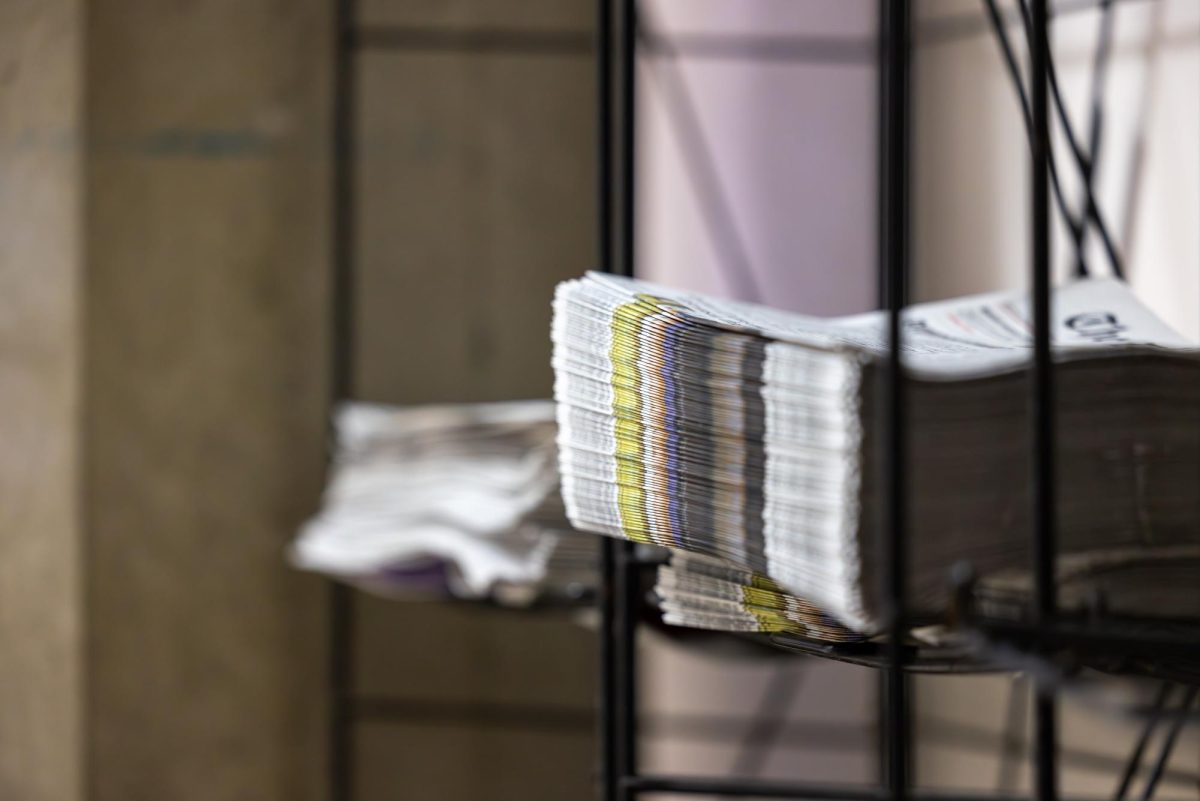The Pennsylvania State University removed all of The Daily Collegian’s newsstands and papers from their campus locations Sept. 18 without notifying staff for violating university policies regarding sales activities and public relations, according to The Daily Collegian.
The Daily Collegian received an email from Penn State after the removal, stating they violated university policies on commercial sales activities at university locations and the use of university facilities by non-university groups, Business Manager of The Daily Collegian Zack O’Brien said.
The Daily Collegian has 35 newsstands and 10 news racks with posters behind them on which businesses can pay to put their advertisements, O’Brien said. Three of those posters displayed Kamala Harris campaign ads and six displayed voter registration ads. All 45 newsstands and racks with the papers they held were removed and taken to an undisclosed location, O’Brien said.
According to O’Brien, the university contacted The Daily Collegian via email before the removal saying administrators wanted to meet with the staff to discuss arising issues, to which the general manager of the staff was completely willing. Ultimately, this conversation did not happen and the university went through with the removal without officially notifying the staff, O’Brien said.
Under the First Amendment’s free speech guarantee, independent student newspapers at public universities have the right to publish any advertisement, whether it’s political or not, as long as it’s truthful and non-misleading, Associate Professor of Journalism and Law at the University of Texas at Austin Amy Sanders said.
Sanders said a worrying aspect of the situation was the removal of the newspapers themselves when the concern from the university was over the ads behind the news racks.
“We did have a Kamala Harris ad for President in our paper that week, and we’re ultimately wondering if [the university] took down our news racks because we violated [the policy] with those news racks, why else?” O’Brien said. “Why did [the university] take down the newspapers as well?”
Six of the posters behind the news racks displayed voter registration ads. A confusing aspect of the situation for the Daily Collegian staff is Penn State’s usual encouragement for students to vote and have their voices heard, O’Brien said. A big question in response to the removals is, “why now?”
The Daily Collegian is completely independent and not currently backed in any regard by the university, including financially, O’Brien said.
Historically, some of the most profitable times for a news organization are election seasons partly because of the advertising revenue they bring in, Sanders said.
The university’s issue with the political advertising — while having cut funding for The Daily Collegian last year — is cause for concern, Sanders said.’
“To simply say that that’s off the table for The Collegian, while cutting its funding and expecting it to be independently funded, I think, sends a very different message to students than ‘We support freedom of the press,’” Sanders said.
The Daily Collegian staff feels with more communication, the issue could have been resolved without the complete removal of all papers and racks, O’Brien said.
As of Sept. 27, The Daily Collegian staff had not received any further specifics regarding the policies they violated or why all the papers were removed along with the newsstands and racks, O’Brien said.
“I wish we had received a little bit of notice that this was happening,” O’Brien said. “I wish our newspapers would have stayed up that entire day, because ultimately, we’re taking it as an infringement on our First Amendment right, the freedom of the press.”
With rising tensions and policy changes surrounding students’ First Amendment rights on campus at universities across the nation, Sanders expressed concerns over the current free speech climate.
Campuses amending their free speech policies and creating ones about what kinds of content are or aren’t allowed on campus are obstacles that are put in the way of students’ First Amendment rights, Sanders said.
“Students who think that they could be disciplined for engaging in their First Amendment rights because they see students on their own campus or other campuses being suspended or expelled are going to be less likely to engage in free speech, to engage in their protest rights,” Sanders said.
The scariest part of the situation is that it could happen to anybody, O’Brien said. When student newspapers don’t have a good relationship with their university, there may be more room for backlash or tension, so fostering a decent relationship between the paper and their university is beneficial, according to O’Brien.
Nevertheless, O’Brien urges student journalists to continue to do what they do best and provide factual content for the public, regardless of the pushback they may receive.
For student organizations that feel they need support or clarification regarding their First Amendment rights, there are organizations that advocate for student rights and student free expression, Sanders said. The Student Press Law Center is a nonpartisan nonprofit that helps high school and university news organizations understand and defend their rights and the Foundation for Individual Rights and Expression works with campuses to help students understand their First Amendment rights, Sanders said.
“I think it’s important that even if students haven’t seen their campus cracking down on their First Amendment rights, that they be aware that that’s happening on other campuses, and that trend could easily spread to their campus,” Sanders said.
The Daily Collegian will continue to run political ads in their papers and potentially on social media, but the paper will halt the political ads behind the news racks until it receives further clarity from the university, O’Brien said.
While the Daily Collegian may face financial obstacles as a result of fewer political ads, the staff will continue to fight and find different solutions to growing their revenue stream, O’Brien said.
“Going forward, we’re going to continue just to do what we do best, which is selling advertisements and making quality news for the Penn State community,” O’Brien said.



